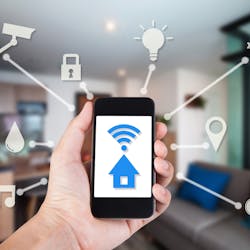According to ABI Research, smart home vendors are uniquely positioned to drive next-generation home care services, especially in the North American and Western European markets. Delivering remote monitoring services to deliver care to vulnerable residents and peace of mind for those that care for them is a market that can reach $34.5 billion by 2024, ABI says. But smart home service providers will have to move quickly to maximize this potential.
"Service providers pushed smart home into the mainstream and now have the ability to do the same for home care monitoring services, particularly Ambient Assisted Living (AAL) systems," said Jonathan Collins, research director at ABI. "AAL has struggled to gain market traction as a standalone offering, but as smart home players build on their smart home efforts to expand into new revenue streams, overlaying AAL capabilities offer the potential for mass adoption."
The global aging demographic, particularly sharp in markets with strong smart home adoption, puts a growing strain on relatives and in-home care providers. AAL is intended to enable unobtrusive, long-term remote monitoring of those at risk living independently. Service providers with smart home capabilities are well positioned to deliver AAL services to their established customer bases, ABI believes. Last year the U.K. utility, British Gas, launched an AAL service that leveraged both its existing installation workforce as well as its Hive smart home device offerings. ABI Research believes such integrations are among the vanguard of a new wave of services from smart home service providers.
However, smart home OEMs are also aware of the opportunity. Smart home devices can be leveraged by OEMs and end-users alike to offer AAL services. The appeal of voice control as a smart home interface extends into AAL provision and applications, such as the Amazon Alexa "Drop In" feature, and offer AAL capabilities. Increasingly, OEMs and resellers are likely to promote and develop AAL services of their own.
"Smart home has been a battleground pitting subscription against freemium services. Vendors moving into the AAL space will not just have to address some of the outstanding marketing and service pricing issues around AAL adoption, but also continue to tackle the threat/opportunity of freemium or AAL-lite functionality," Collins said.




